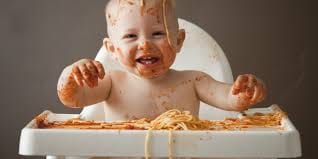Should Children Play With Their Food?
We want our children to have good table manners and often we tell them off for playing with their food. But should we actually let our children play with their food?
Why You Should Let Your Small Children Play With Their Food
Sensory Development: At this early stage, you can’t put your baby in the sandpit, or use finger paints in case they put unwanted things in their mouths. But you can let them smush their banana, smear their pumpkin puree, or squeeze their pasta. Experimenting with their food as they eat it is your baby’s first sensory development. They are learning textures, coordination and so much more, at the same time as playing.
Learning Valuable Skills: Let your little one put their whole hand into their apple sauce. When they put their hand to their mouth, they will realise they can get food off it. This is the pre-cursor to learning to feed themselves with utensils. Sometimes we need to let our kids get a bit mucky while they eat, that way they will learn it is alright to get mucky in other situations. Not exposing them to textures now, may make them fearful of new textures when they are older.
Positivity: Constantly policing your small children on their table manners will make the dinner table a negative experience. This can make your child dislike sitting at the table and may affect their eating habits. Letting them play with the food a little bit keeps the atmosphere positive.
Of course you will reach a stage where you need to begin to teach your children correct table manners and etiquette. But let them enjoy this acceptable messy stage while they can.
To help cope with the mess, you may want to invest in a Waterproof Splat Mat to pop under your little one’s highchair.
Creating is Fun and Educational
Cooking is one of those rare things that we still have to do manually. There are so many opportunities for learning when we cook. Here are some of the areas we learn:
Reading: Most dishes fancier than spaghetti on toast will need a recipe to succeed. Have the kids help read the ingredients list and instructions.
Math: Measuring out the right amount of each ingredient is vital. It’s a great opportunity to discuss measures and fractions.
Science: Mixing ingredients, or performing certain actions can make great scientific processes. Vinegar and baking soda make a wonderful scientific mess, whipping egg whites change the structure of one ingredient and making dough creates a textural kneading experience.
Playing with the food as you create it will make the kids more likely to eat it when it reaches the table.
Extend Time at the Table
While this tip does not involve physically playing with food, it is still play at food time. A little bit of play can extend the time that you sit at the table together as a family. Often with our busy lives, we dash in for dinner, scoff the food on our plate and then race off to the next thing. But wouldn’t it be nice to extend the opportunity for family time and interaction.
Use these ideas for a bit of play time at the table:
Play Music: Each family member can take turns picking their favourite music to play at the dinner table. Mum and Dad might choose to play their favourites from when they were young. Kids are always fascinated by the thought of their parents before they were parents. Get your older kids on board with this to get a peek into their lives and their current interests. It may encourage conversation in other areas too.
Talk: Start a tradition where each family member says their favourite thing about the day that has just been. If you are feeling brave, then you can talk about the not so good things that happened in the day too. Take this captured moment to connect and share parts of the day when you weren’t together.
Memory Lane: Each family member takes a turn picking a favourite family memory. Then the other members of the family have to ask questions to try and guess what the memory is. Relive the fun times, the happy times and the times you made each other laugh.
This time at the table is so valuable as a family. It’s a real opportunity to pause everything else that is going on around you, to focus on each other.
As you can see, there are definite benefits to letting your children play with their food. While it is important to let them play, it is also important to teach them correct table manners. The last thing you want is for your teenagers to be throwing food at each other in a restaurant and trying to eat their soup with their hands!

